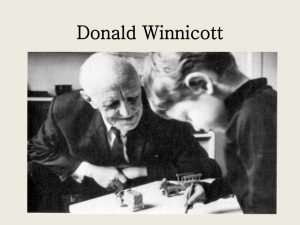The psychoanalyst Donald Winnicott wrote about the capacity to be alone as one of the signs of emotional maturity. He is looking at this in a positive way rather than the fear of being on one’s own or being in a withdrawn and depressed state. He is not talking about actually being alone – as he points out you might be in solitary confinement, or as currently for some on your own in lockdown and yet not be able to be alone. Then, if you are actually on your own and without the emotional capacity to really bear it, there is great suffering.
Winnicott understood from his work with small children – he was also a paediatrician – that the capacity comes from having had the experience of being alone as an infant and small child, but, in the presence of another. Here is the paradox ‘the experience of being alone while someone else is present’. He sees this as a rather special type of relationship where the child is there and the mother or mother substitute is reliably present, even if at that moment represented by the pram, or a cot, or even the general atmosphere of the environment… so the implication is that the presence of each is important to the other, and this experience has become internalised in the child. Maturity and the capacity to be alone imply that ‘the individual has had the chance through good-enough mothering to build up a belief in a benign environment’. In other words there is the gradual building up of a safe internal environment within which the individual can discover their own personal life.
So, when the person has not had this good-enough early upbringing, the alternative is that the false self is built up with reactions to what is happening outside – the external stimuli and that can become very uncertain and anxiety making. Winnicott doesn’t discuss it but I can see here how a personal faith and relationship with God can gradually repair a damaged capacity to be alone that never got fully established, and, so, over time, how an internal world can be built on the repetition of good-enough experiences in the presence of the Divine – perhaps especially so through meditation and a deepening of the sense of the Other. Here God becomes the M/Other and a benign environment built on trust and faith.
